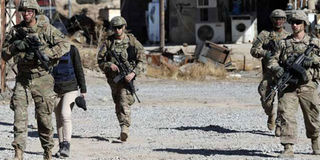Red Cross survey shows surging acceptance of torture in conflict

US soldiers patrol near an Iraqi army base in the outskirts of Mosul on November 23, 2016. Acceptance of torture of an enemy fighter to obtain information is soaring. PHOTO | AFP
What you need to know:
- The survey of more than 17,000 people carried out in 16 countries showed that most people believe wars should be limited by international rules.
- The survey — the largest of its kind ever carried out by the ICRC — was conducted between June and September this year in 10 countries experiencing conflict, including Iraq, Nigeria and South Sudan.
GENEVA
A vast Red Cross survey published Monday indicated that the acceptance of torture during war has increased dramatically in recent decades, with fewer than half of people now categorically rejecting the practice.
The survey of more than 17,000 people carried out in 16 countries showed that most people believe wars should be limited by international rules, banning for instance indiscriminate attacks on populated areas or attacks on hospitals and health care workers.
But it also revealed that only 48 per cent of respondents said it was wrong to torture enemy combatants to obtain important military information, while a full 36 per cent said that doing so is permitted and 16 per cent said they did not know.
In a similar survey conducted in 1999, 66 per cent of those questioned said it was blatantly wrong to use torture in such cases, while 28 per cent said that doing so was acceptable and six per cent were unsure.
"The results... show that we all need to redraw a line in the sand: torture in any form is forbidden," Peter Maurer, president of the International Committee of the Red Cross (ICRC), said in a statement.
"We demonise our enemies at our own peril. Even in war, everyone deserves to be treated humanely," he insisted.
"Using torture only triggers a race to the bottom. It has a devastating impact on the victims, and it brutalises entire societies for generations," he warned.
The survey — the largest of its kind ever carried out by the ICRC — was conducted between June and September this year in 10 countries experiencing conflict, including Iraq, Nigeria and South Sudan.
Also included in the study were the five members of the UN Security Council — the United States, China, France, Russia and Britain, known as the P5 countries — as well as Switzerland.
WITHIN THE LAW
The survey indicated that people who live in or near a conflict-affected country were "more likely to respond humanely to questions on the laws of war", ICRC said in the statement.
In the P5 countries meanwhile, "it appears that people are more resigned to civilian casualties and suffering as an inevitable part of warfare", it said.
For instance, a full 78 per cent of people living in countries affected by conflict said it was wrong to attack enemy fighters in populated areas where many civilians risked being killed, compared to just 50 percent of respondents in P5 countries, the survey showed.
That divide was not as clear when it came to torture.
At 70 per cent, respondents in conflict-battered Nigeria were the most likely to say torture of an enemy fighter was acceptable to obtain important military information, followed by Israel at 50 per cent.
The United States, where President-elect Donald Trump has suggested he might authorise the torture of detainees, including water boarding, to gain information, was not far behind, with a full 46 per cent saying such practices were permitted.
Maurer, meanwhile, took heart in other parts of the survey that indicated that two thirds of respondents considered that the so-called Geneva Conventions that impose limits on war remained important.
"It is clear that people do not believe in a battlefield 'free for all'", Maurer said.
"The survey shows that there's a disconnect between the public, who believe that targeting civilians, hospitals and humanitarian workers is unacceptable, and the policies and actions of states and armed groups who commit these acts," he insisted.





